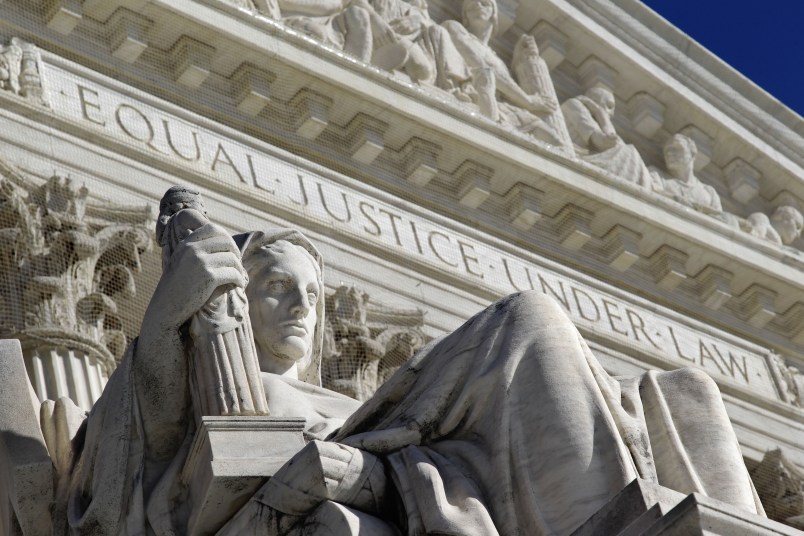With a Supreme Court decision on ‘Obamacare’ expected this week, tensions have reached a fever pitch as observers eagerly await the verdict on the law’s constitutionality.
Just three months after legal experts widely predicted the health care reform law would be upheld, expectations have changed dramatically and conservatives are bullish about victory.
The outcome remains unpredictable, and the deciding vote is believed to rest in the hands of Justice Anthony Kennedy — and perhaps Chief Justice John Roberts. “At the Supreme Court, those who know don’t talk; and those who talk don’t know,” Justice Ruth Bader Ginsburg said recently.
But subtle — albeit inconclusive — hints dropped recently by Justices Ginburg and Antonin Scalia have fueled a months-long shift in expectations among observers regarding the fate of President Obama’s signature legislative achievement.
Justice Ginsburg, a likely vote to uphold the law, last week foreshadowed “sharp disagreement” in the high-profile decisions to come this month. “Some have described the controversy [over the health care law] as unprecedented,” she said at a legal conference.
“If the individual mandate, requiring the purchase of insurance or the payment of a penalty, if that is unconstitutional, must the entire act fall?” she said, according to CNN. “Or, may the mandate be chopped, like a head of broccoli, from the rest of the act?”
Ginsburg evoked “the utility of dissenting opinions” to “propel legislative or executive change.”
Meanwhile, Justice Scalia published a book this week in which he found fault with Wickard v. Filburn, the 1942 ruling that constitutes the legal foundation for the constitutionality of the individual mandate. The decision, which granted Congress broad authority to regulate activities that have a substantial effect on interstate commerce, has since been reaffirmed and expanded, most recently by the Supreme Court in the 2005 Gonzales v. Raich case.
Notably, Scalia concurred with the 6-3 majority in Raich that relied heavily upon Wickard to authorize the sweeping federal power in question. His admitted reversal on the Commerce Clause just ahead of the health care ruling — “wisdom has come late,” he writes — indicates that the outspoken conservative justice is laying the groundwork to strike the law down, which he not-so-subtly hinted he’ll do during oral arguments back in March.
The ‘Obamacare’ lawsuits were initially seen as a long-shot as even conservative scholars agreed that the individual mandate comfortably fits within longstanding judicial precedent. The magnitude of the shift in expectations since then was embodied last week, with Republicans openly preparing for victory and Democrats admitting they’re hedging their bets.
“[I]f the Court strikes down all or part of the president’s health care law, there will be no spiking of the ball,” House Speaker John Boehner (R-OH) wrote in a memo to his GOP members, which was also sent to reporters.
Progressive supporters of the law, fearful that an unfavorable ruling will give their party cold feet, are downplaying the importance of the individual mandate to the overall law. That view cuts against a policy consensus that covering pre-existing conditions is problematic without a requirement to purchase insurance. Democratic Party stalwart Howard Dean went further in dismissing that: “I don’t give a damn about the individual mandate,” he said. “It was a foolish thing to do anyway, and I hope it does get thrown out.”
The liberal advocacy group MoveOn.org sent supporters an email Thursday titled “Supreme Court: Justices or politicians in robes?,” courting signatures for a petition demanding that the court “[b]roadcast the proceedings” on the Affordable Care Act so that the public can “better understand how and why the Supreme Court reaches its decision.”
So what caused such a seismic shift in expectations? Part of it was the relentless attacks from Republicans and the conservative movement decrying the mandate as federal overreach, which mainstreamed a fringe legal theory.
“We haven’t seen the media pick up a legal argument and make the argument mainstream by virtue of media coverage,” the legal scholar Orin Kerr, an early libertarian skeptic of the ‘Obamacare’ lawsuits and former clerk to Kennedy, told The New Yorker. “[T]here were two conservative district judges who agreed with the argument, largely echoing the Republican position and the media coverage. And, once you had all that, it really became a ballgame.”
As reporters eagerly await a decision this Monday or Thursday — although the Supreme Court could potentially postpone it — progressives are bracing for the worst.
“If the court does overturn the mandate, it’s going to be hard to know how to react. It’s been more than 75 years since the Supreme Court overturned a piece of legislation as big as ACA, and I can’t think of any example of the court overturning landmark legislation this big based on a principle as flimsy and manufactured as activity vs. inactivity,” wrote Kevin Drum at Mother Jones. “It would mean that the Supreme Court had officially entered an era where they were frankly willing to overturn liberal legislation just because they don’t like it. Pile that on top of Bush v. Gore and Citizens United and you have a Supreme Court that’s pretty explicitly chosen up sides in American electoral politics. This would be, in no uncertain terms, no longer business as usual.”










